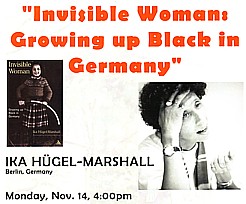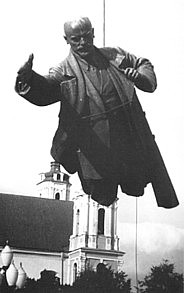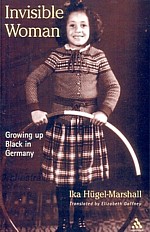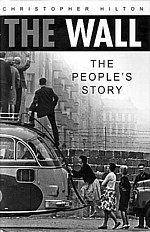| Old
Announcements
(back to top)
- Jan. 5, 2004: The readings for Jan. 7 are also available
on-line: poem "The Master
Race"; H-German
discussion comparing Iraq in 2003 and Germany in 1945
- Apr. 2, 2004:
 The
German film Goodbye Lenin just opened in Santa
Barbara. It is a wonderful comedy that turns the fall of the Berlin
wall on its head (the Westerners flood eastward!). A must-see for students
in this course--you'll recognize much of the documentary footage we
saw. Here are some links: Internet
Movie Data Base plot summary; trailer
(on apple website); German
homepage The
German film Goodbye Lenin just opened in Santa
Barbara. It is a wonderful comedy that turns the fall of the Berlin
wall on its head (the Westerners flood eastward!). A must-see for students
in this course--you'll recognize much of the documentary footage we
saw. Here are some links: Internet
Movie Data Base plot summary; trailer
(on apple website); German
homepage
- Sept. 29, 2004: I found an interesting teaching site
developed since 1999 by a German teacher teaching at an elite school
in Korea, "WHKMLA,"
hosted by the Center for Instructional Media in Germany. It is in English,
and especially the links seem to be unique (they go beyond the usual).
- Nov. 11, 2004: Was Ronald Reagan the "real"
cause of the fall of the Berlin Wall? In an op-ed piece in the LA
Times "It
was Reagan who tore down that wall," conservative historian
Dinesh D'Souza argues he was. My and other letters to the editor argue
he wasn't.
So: What evidence does D'Souza present to make his case? What did
cause the fall of the wall?
- July 27, 2005: Deutsche Welle's Dummy's
Guide to German Elections is quite good.
-
- Oct. 26, 2005: This
 class will be offered MWF 11-12 this coming Winter quarter. Interested
students are encouraged to attend the Nov. 14 talk by Ika Hügel-Marshall:
"Invisible Woman: Growing Up Black in Germany," followed by
a discussion. 1001 Life Sciences Building.
class will be offered MWF 11-12 this coming Winter quarter. Interested
students are encouraged to attend the Nov. 14 talk by Ika Hügel-Marshall:
"Invisible Woman: Growing Up Black in Germany," followed by
a discussion. 1001 Life Sciences Building.
Ika Hügel-Marshall's
translator, Dagmar Schultz, is also the co-producer of a 28-minute film,
"Hope in my heart: The May Ayim Story", which is a documentary
on the life and untimely death of Afro-German poet May Ayim. The film
will be screened following Ika Hügel-Marshall's lecture. Dagmar
Schultz will introduce the film and be available for the discussion
afterwards.
- Nov. 18, 2005: Course books for Winter 2006
will be [prices are $new/used] (see also Thumbnail
image links, below):
- Mary Fulbrook, Divided Nation: Germany
1918-1990 (Oxford, 1992) [$34/2
at amazon] UCSB: DD240.F85 1992
- 12/11/05: The 2002 Blackwell edition, History
of Germany 1918-2000: The Divided Nation
($35/24
at amazon) is acceptable as well. The text is identical
except for 3 1/2 pages of new epilog at the end of chap. 13
(345 old=279-282 new), and the final paragraph of chap. 14 has
been replaced and expanded (p. 368f old=301f new). (The bibliography
has been updated as well.)
- The 1992 edition is available for on-line
checkout at the UCSB
library. BEFORE YOU CLICK: copy "Fulbrook
divided nation" to paste into the keyword search box. That
gives you 5 hits including the 2002 updated edition; the electronic
version is no. 4). The title link takes you to netlibrary, where
you give yourself a login and password. If you just "browse"
it (you can type in page numbers in the upper right), others
can use it at the same time; if you "check it out,"
no one else can access it.
- Ika Hügel-Marshall, Invisible Woman: Growing
Up Black in Germany (Continuum, 2002) [$10/3
at amazon] HQ1625.H84 A3 2001
- Christopher Hilton, The Wall: The People's Story
(Sutton, 2003) [$13/7
at amazon] DD881 .H57 2001
- Jana Hensel, After The Wall: Confessions from an East
German Childhood and the Life that Came Next (Public
Affairs, 2004) [$16/5
from amazon]
- Dec. 12, 2005: I'm just beginning to construct the
website with current information. For now, to find out more about the
course, visit the 2004 133c
website, with the 2004
133c syllabus.
- Dec. 26, 2005: I'm doing some work updating this
page:
- Jan. 9, 2006: There will not be a reader this year.
I've found most of the sources on-line, and will scan the few other
essays for printing or reading on the web. (see the 2004
hyperlinked reader)
- Jan. 17, 2006:
- The 2006 syllabus
is now available on-line (with the corrected Hügel-Marshall
reading assignment for Jan. 27-Feb. 1).
- L1:
Introduction, and a preliminary version of L2:
What is Germany? are also available.
L3: 1945 Film is
pretty much complete.
- On Wednesday after class I will give
add codes to the students on the waiting list.
- The two evening films will be shown on the Wednesdays
Feb. 15 and March 15. More students said they could make the 6-8pm
time slot than 7-9pm. However, the registrar says only Broida (284
seats) is available earlier, so I will ask whether we can't take
the later time slot and get a more suitable room. [Promise
1 hr 55 mins; Lenin 2hrs. 1 min.]
- Additional paragraphs
from textbook (also from the assigned chap. 14)
- Jan. 19, 2006: Friday 1/20 we will have midterm Q1,
which will be about German political parties.
- You should review the following textbook pages (Fulbrook 1992
edition): 23, 33, 46f, 55-7, 67, 137f, 170, 180f, 212ff, 247, 254,
282, 337f.
- I'd suggest making a list of the acronyms of the political parties
(esp. the post-1945 parties!) and what they stand for, and maybe
draw a diagram showing whether they are on the political left, in
the center, or on the political right.
- You can also look up the various parties on the web (SPD, CDU,
FDP, SED, KPD, Greens, Center, DDP, and so on). Many websites
are in German, but here is one with descriptions in English:
- GermanCulture.com.ua
political parties page has links to its own
pages with English descriptions of the currently active German political
parties. Its Weimar
Republic page includes brief characterizations of some of the
historical parties.
According to site host Tatyana Gordeeva, this content moved from
about.com to the current Ukrainian-hosted location in Dec. 2001.
- Jan. 25, 2006: today will have Q2, based on textbook chapter
6. While you're reading you may want to focus especially on the Potsdam
conference, denazification, and the reasons for the division of Germany.
If you have questions about the book essay, today is the day to ask
them!
- Jan. 19, 2006 (updated 1/28/06): Rooms for evening
film screenings
  (campus
map) (campus
map)
- Wed., Feb. 15, 7-9pm: North Hall 1006. The
Promise (1995, 1 hr. 55 mins.).
Alternative date: 2/16, 6:30pm in HSSB 4020
- Wed., Mar. 15, 7-9pm: North Hall 1109. Goodbye
Lenin (2004, 2 hrs, 1 min)
Alternative date: 3/16, 6:30pm in HSSB 4020
- Jan. 26, 2006: Book essay: Books about Nazi
Germany; very short or very long books.
- Several people have asked about books about Nazi
Germany and the Holocaust for the book essay. In general, this is
not ok. However, there are ways to link those books to post-1945
Germany so that they would be acceptable. One way would be to examine
how the book was received in Germany when it was published. Another
is to do a "web project"--a commented guide to reviews
of and websites about the book or its author. If you are interested
in doing this, ask me about it in class.
- Two webpages
I recommend for guidelines about evaluating web sites are:
UC Berkeley library: Evaluating
Web Pages: Techniques to Apply & Questions to Ask (detailed
how-to guidelines and explanations)
- New Mexico
State library's "The Good, The Bad & The Ugly: or, Why
It's a Good Idea to Evaluate Web Sources" page has 5
Evaluation Criteria (checklist with brief rationale).
- Some topics are only treated in very short or
very long books. If you choose a short book, I will expect much
more outside research (reviews, about the author, other treatments
of the topic, perhaps on the web). If you choose a very long or
difficult book, I won't expect too much more than an accurate summary
description of the book and its thesis (i.e., you don't have to
analyze as much).
- Jan. 27, 2006: I'm working on the lecture outlines:
L5-Political Parties,
L6-Weimar and Nazi Germany
are just about done.
- Jan. 28, 2006: I forgot to announce on Friday that
you should start reading Growing up Black in Germanythis weekend
and finish it by Wednesday. It's not a long book, but you should probably
start it this weekend. Also lecture outlines L7-Defeat
and Its Legacies, and L8-Four
Ds are available.
- Jan. 30, 2006: Rescheduling. I've
decided that it would be better to postpone the discussion of Invisible
Woman: Growing up Black in Germany until Friday. We will also do
Q3, based on that book, on Friday. I've also updated the CourseLinks
page with suggested books for
the essay.
- Jan. 30, 2006: going through your book proposals,
I find that 6 students have chosen to do the Stasi, based on the same
two books (Funder and Koehler). I'd like to propose some alternatives
that you can look into:
- Timothy Garton Ash, The File (amazon)
- Mike Dennis, Norman Laporte, The Stasi: Myth
and Reality (amazon)
- Dirk Philipsen, Voices from East Germany's
Revolutionary Autumn of 1989 (amazon)
- Peter Marcuse, A Personal and Political Journal
of a Year in East Germany, 1989-1990 (amazon)
- Robert Darnton, Berlin Journal, 1989-1990
- Jonathan Grix. The Role of the Masses in the
Collapse of the GDR (amazon)
- A. James McAdams, Judging the Past in Unified
Germany (amazon)
- Feb. 6, 2006: Q4 will be on Wed., 2/8, about the
state structures described in textbook chapter 10.
- Feb. 9, 2006:
 notes
for L9-10: Causes of
Division, Blockade and 1953, now available. For next week: notes
for L9-10: Causes of
Division, Blockade and 1953, now available. For next week:
- Monday: discussion of Hilton up to p. 240 (Q5)
- Wednesday, 7-9pm: film "The Promise,"
NORTH HALL 1006
Thursday, 6:30-8:30pm, HSSB 4020: "The Promise"
(imdb page)
- Friday: paper drafts due, Q6
on The Promise
also: possible visit by Prof. Mahlendorf, who fled to W. Germany
at the end of the war.
- Feb. 12, 2006: I haven't had enough time to get very
far with putting up the rest of the lecture notes yet, but I want to
be sure that everyone knows that you need to have read Hilton, The
Wall: The People's Story pp. 1-240 by Monday. In class I noted
that the end of chap. 3 (pp. 77-82) make a crucial point. We will have
Q5 on Monday.
- Feb. 13, 2006: On Wednesday, 2/15, Prof. Ursula Mahlendorf
will come to our class to read portions of her memoir that she is still
writing, and to answer questions and discuss issues that arise. Here
are the chapters she will read from, which are also the texts for the
extra credit assignment due Wednesday:
- [for background, see this introduction
(2 single-spaced pages)]
- Memoir chapter
8: The Russian Invasion (18 pages)
- Memoir chapter
9: Silesia becomes Polish (19 pages)
- Extra credit: Read chapters 8
and 9, and type 4 questions you would like to ask Prof.
Mahlendorf. You should ask some of these, and hand them in at the
end of class (typed only). Worth the same as a "Q": up
to 4 points.
- Feb. 14, 2006:
- Feb. 21, 2006: I'm trying something new--doing my
usual midterm course evaluation on-line.
- Please take the Hist
133c midterm evaluation survey. [3/3/06:
results reported in L21]
- There are 10 radio button questions, 1 required text box, and
3 optional text boxes.
[note 3/3/06: put all optional at end--otherwise
empty cells in .csv export file]
- The survey
results page can be accessed publicly. (I've never done this
before, so I don't know what it will look like...) [note 2/27: output
is a real pain. I'm still tweaking it in excel.]
- Please do this asap--I would really appreciate hearing from the
whole class by Thursday, Feb. 23. Thank you!
- Feb. 27, 2006: The reading for Wed., Mar. 1, is available
as scanned images; more easily printable OCR text will be available
soon.
- Dirk Philipsen, "The Troubled Emergence of
an Idea" (1993), scans
of pages 35-55. (easier for on-screen reading, but won't print
well)
- If you want to print it, use this OCR
text of pp. 35-55. (my browser prints it on 17 pages)
- NOTE: Q8 on Wednesday will be
based on this reading.
- note 3/3/06: 10/16 students read the OCR text
(4 printed it); 2 read the images online.
- March 5, 2006: We had an important lecture on Friday
(3/3), and only half the class was there.
- Thus there will be Q9 on Monday
(3/6), about Fulbrook pp. 267-78 and chapter 13.
- I've added up Q1-8 scores. To check my addition,
if you still have your papers, you can tell me what total you get.
Count a "+" as +0.5, and a "-" as -0.5. Write
this on Q9 or Q10. If there is a discrepancy I'll check my addition
and possibly ask you to resubmit. Range: 17 to 36, with outliers
of 12 and 39.
- I've started catching up on the web site: Web
Option handout, 1989 handout,
- March 12, 2006: We will have Q10 tomorrow (Monday),
on Jana Hensel's After the Wall.
Note: add up all of your previous Q scores plus the extra credit
on Prof. Mahlendorf, and write the result on your Q10.  That
will enable me to check my recordkeeping and addition. That
will enable me to check my recordkeeping and addition.
- Don't forget the evening film screening this Wed., Mar.
15, 7-9pm: North Hall 1109: Goodbye Lenin (2004,
2 hrs, 1 min). Alternate date: 3/16, 6:30pm in HSSB 4020.
- An extra credit "Q11," given at the screening, can be
submitted on Friday.
- March 15, 2006: I've made a page of lecture notes
for L24-26 on the Process of Unification, including Mr. Fawcett's
lecture. The notes are a rump that don't connect to other notes yet.
I hope to get to these by next Monday, so they'll be available for the
final exam.
- Final announcements: Before Friday's lecture
I will try to grade all papers and upload at least preliminary versions
of the web option papers I've received, so that I can return your
papers.
- There will be no final exam study guide--I simply
don't have time before Friday. You can see the 2004
study guide and exam
for an idea of how the exam will work. As announced on the syllabus,
there will be 3 of 9 IDs and 1 of 2 essay questions. It will be
a word-limited take-home, due next Thursday during the exam period
(noon-3pm). I will try to publish it by next Tuesday, 3/21, 6pm.
- March 16, 2006: As I announced in class, I will make
the take-home final available by noon on Wed. 3/22,
but possibly on the web as early as Tuesday evening. It is due at the
absolute latest on Thursday at 3pm in my office, HSSB 4221. It is word-limited
and should be typed. For details see the March 15 announcement.
- March 17, 2006 (last class day):
 |
Actual demontage
of Lenin statue in Vilnius, Lithuania, in 1991. (The images in
the Good-Bye Lenin film were created digitally.)
Auf Wiedersehen!
[note Dec. 2014: thanks to the reader who alerted me to the fact that this photo is NOT from Bucharest!]
|
Very good turnouts at both showings of Good Bye Lenin--I'm
pleased, and I hope you enjoyed the film. Two choices for the extra
credit ("Q11"), which must be submitted right at
the beginning of class (no opportunity to do it in class):
- for 4 points max: Reflect on how Alex's lying for the good of
his mother was like the GDR leadership's lying to its populace (or
not). OR
- for 3 points max: Write a paragraph or two about a scene in the
film that you found significant, and why.
- March 21, 2006, 11:30pm: The 2006
final exam is now available. I will leave hard copies outside my
office door by 12:30pm Wednesday. The typed exam is due by 3pm Thursday.
- March 23, 2006: I will be in my office today, Thursday,
noon-3pm to accept the final exams and return your papers.
- A note on the final: I used to give a slightly longer exam (3
IDs, one source interpretation, one essay question) during a TWO
HOUR period as an in-class exam. Thus you should be able to complete
the final exam in 2 hours, even including the typing time.
- To all of you whom I don't see: have a good spring break!
Any leftover work will be available for pick-up next quarter.
My office hours in spring 2006 will be W & Th, 1-2pm.
- draft of web papers index page
|









 The
German film Goodbye Lenin just opened in Santa
Barbara. It is a wonderful comedy that turns the fall of the Berlin
wall on its head (the Westerners flood eastward!). A must-see for students
in this course--you'll recognize much of the documentary footage we
saw. Here are some links:
The
German film Goodbye Lenin just opened in Santa
Barbara. It is a wonderful comedy that turns the fall of the Berlin
wall on its head (the Westerners flood eastward!). A must-see for students
in this course--you'll recognize much of the documentary footage we
saw. Here are some links: 
 (
(